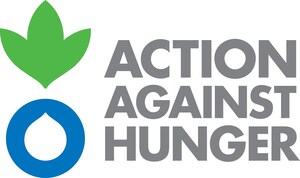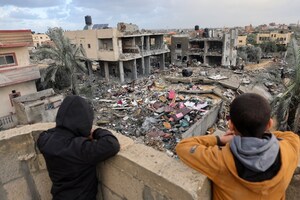JERUSALEM, May 20, 2021 /PRNewswire/ -- Recent conflict between Israel and Palestinian Armed Groups in Gaza has damaged or destroyed critical basic services, including hospitals, roads, and water systems, warned Action Against Hunger, an international, nonpartisan nonprofit organization working to provide humanitarian relief in the region.
Since May 9, when violence began to escalate, more than 75 conflict-related incidents have affected networks supplying electricity as well as water and sanitation, such as sewers, wells, water pumping stations, solid waste dumps, and the desalination plant in northern Gaza, which supplies water to some 250,000 people. In total, more than 800,000 people in Gaza have been affected by damage to water and sanitation systems, intensifying the risk that illness, including COVID-19, will spread.
"The damage and destruction of water and sanitation infrastructure will have a dramatic impact on the health of the population, who face an increased risk of infection and disease due to the lack of clean water and wastewater management," said Lucas Honauer, Director of Action Against Hunger's programs in the Occupied Palestinian Territories.
As hostilities intensified, claiming the lives of more than 225 people as of May 19, road movement has become increasingly difficult. A lack of fuel and medicine, as well as ongoing violence, are hampering the humanitarian response. The conflict has had a severe impact on Gaza's health system.
Despite being protected under International Humanitarian Law, the Hala Al Shawa Health Center was destroyed by an Israeli airstrike, and the Beit Hanoun and Indonesian hospitals, where Action Against Hunger works, have suffered damage. The few functioning hospitals are becoming overcrowded as they care for the wounded while continuing to treat COVID-19 cases. Al Remal Health Center, which was the primary facility for conducting COVID-19 testing for the Gaza Strip, was destroyed on May 17 by an airstrike, hampering pandemic response efforts. The Gaza Ministry of Health has also reported that hospitals are facing a concerning lack of equipment as a result of restrictions on movement.
"We are at a critical moment in which the Gaza Strip is facing very high contagion rate of COVID-19 and access to water and sanitation remains the first and easiest way to protect themselves," Honauer said. "Further exacerbating the crisis are high levels of displacement caused by the bombardments, which have resulted in overcrowded shelters where people don't have access to clean water and adequate sanitation."
Energy supply is another critical challenge. Fuel is running out, which could have a direct impact on the production of electricity by the Gaza Power Plant. The power supply in Gaza has already been reduced to fewer than seven hours of electricity per day, making it even more difficult for hospitals to continue to operate and for other lifesaving services to be delivered.
It is essential that both sides respect International Humanitarian Law and allow humanitarian organizations to respond to this emergency with guarantees of safety for their staff.
Action Against Hunger teams in Gaza are gathering information to assess damages and to design an adequate response to meet the needs of civilians. The security situation in the Gaza Strip remains highly unstable and humanitarian access is still challenging after more than 10 days of conflict.
Action Against Hunger and the humanitarian community renew their calls for a humanitarian corridor to be created to provide immediate support to people in Gaza and to prevent further deterioration of the humanitarian situation.
About Action Against Hunger
Action Against Hunger is the world's nonprofit hunger specialist and leader in a global movement that aims to end life-threatening hunger for good within our lifetimes. For more than 40 years, the humanitarian and development organization has been on the front lines, treating and preventing hunger across nearly 50 countries. Typically, it serves more than 17 million people each year and has been working in the West Bank since 2002 and in the Gaza Strip since 2005, providing essential water, sanitation, hygiene, and food security services.
SOURCE Action Against Hunger

WANT YOUR COMPANY'S NEWS FEATURED ON PRNEWSWIRE.COM?
Newsrooms &
Influencers
Digital Media
Outlets
Journalists
Opted In





Share this article